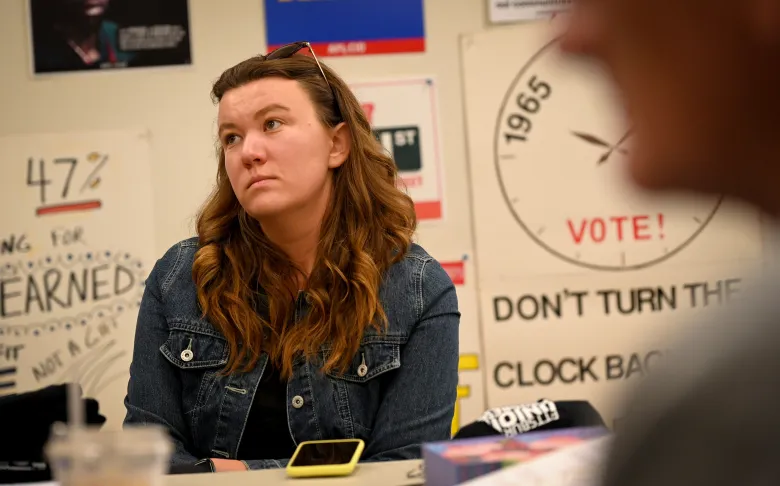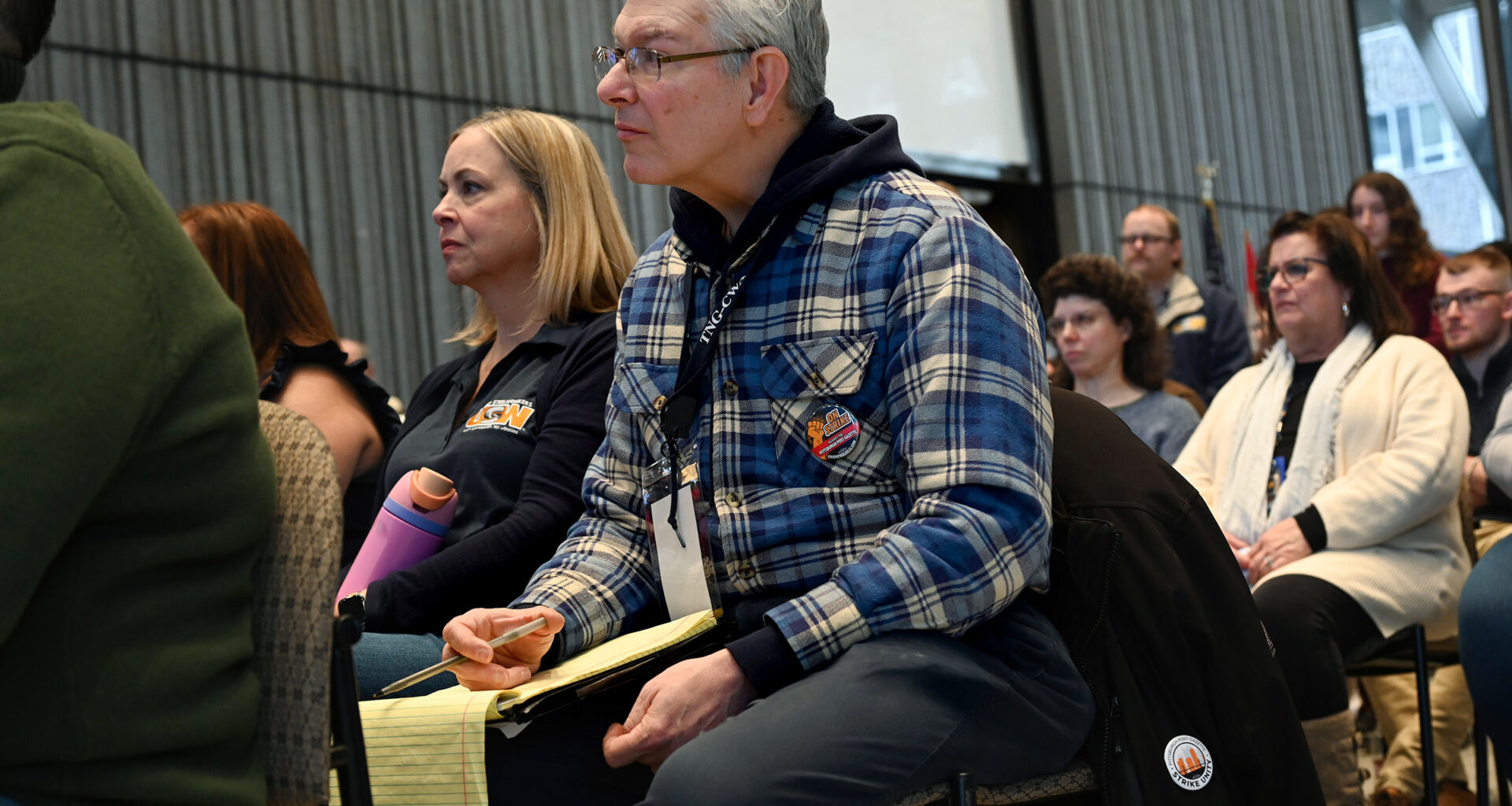At noon on Oct. 18, 2022, journalists of the Newspaper Guild of Pittsburgh went on an unfair labor practice strike at the Pittsburgh Post-Gazette. PUP, which has been documenting the strike from the start, is marking the third year anniversary of the nation’s longest ongoing strike by asking some of our colleagues to share their thoughts about their fight for a fair contract. We’ll update with more over the coming days as the strikers await rulings on their case from the Third Circuit Court of Appeals.
A wedding, a death and a strike
So what’s happened in my life the past three years? Let’s see…
There were highs. Our only daughter got married. The celebration took place in an apple orchard outside of Boston. A father-bride dance at a wedding is always special, but dancing to the Temptations’ “My Girl” and remembering the toddler who couldn’t say S yet call the song “I got hun hine” instead of “I got sunshine” melted me.
There were lows: My only brother got sick and died. Illness killed him in 10 days. He was a complex man trying to live a simple life, working two jobs, eating breakfast at Pamela’s in Oakland before church every Sunday and dinner Friday night at Emil’s in Rankin.
Oh yeah, and I’ve been on strike.
My remarkably strong colleagues and I are fighting an employer hell-bent on breaking as many labor laws as necessary. The Post-Gazette wants to bust a union that had worked together with the company for more than 90 years. The PG hasn’t been successful yet and it won’t be.
What sticks out about the strike? Again, the highs and lows:
• The unbelievable energy one month into the strike when strikers and community supporters showed up outside the editor’s wedding reception at the Duquesne Club. We brought with us a blow-up Scabby the Rat wearing a veil. It was quite a spectacle. Any normal employer would have folded then and there.
• Hooting and hollering till my ears hurt on a car ride back from Toledo on a cold afternoon in January 2024. We’d just received word that the National Labor Relations Board’s administrative law judge ruled overwhelmingly in the union’s favor. He confirmed what we already knew: The company had been violating labor law for years in contract negotiations.
• Facing the indignity of a criminal charge filed against me by the executive editor of the Post-Gazette for criminal trespass. My horrific crime? Holding a strike sign while a 4-year-old pushed it into the ground on his lawn. It took three months to get to a hearing, then less than an hour for the district judge to throw it out.
What have I learned through these three years of madness? Old dogs can learn new tricks. Through lots of practice, this normally shy guy can do a fair job speaking in public. (It helps when you’re living what you’re talking about.)
I’m more patient and almost never just hang up when I get a phone call from a solicitor or pollster. I’ve done that job trying to raise money for the strike. I now realize they are just someone trying to make a living the best way they can.
I have more empathy for others. It’s a highlight to join colleagues about once a month delivering food for distribution to victims of the East Palestine train derailment. These folks are still struggling to piece their lives back together.
At 69, I’m more than old enough to retire. But I refuse to go out on these terms and let someone else determine when I’ve outlived my usefulness.
How have we gotten through three years on strike? Everyone is different, but in my case, I must point to my wife Janet. You’ll find her in as many strike rallies as anyone. She’s been unbelievably supportive and tolerant. We should be heading off into our golden years, but that’s on hold. I tell her we’ll replace that old bathtub with a walk-in shower and take a real vacation some time soon, but I can’t promise exactly when.
First, we’ve got a strike to win.
— Ed Blazina, transportation reporter on strike
***
 Striking Pittsburgh Post-Gazette worker Rick Davis at his home office, where he coordinates sports coverage of the Pittsburgh Union Progress, the newspaper published by the striking journalists. (Steve Mellon/Pittsburgh Union Progress)
Striking Pittsburgh Post-Gazette worker Rick Davis at his home office, where he coordinates sports coverage of the Pittsburgh Union Progress, the newspaper published by the striking journalists. (Steve Mellon/Pittsburgh Union Progress)
He said ‘no more’
After three years on strike, it’s natural to wonder if you made the right decision. Sacrificing so much time affects many aspects of your life — I’ve even taken a big hit on my Social Security that I just won’t be able to recoup. Every day, I weigh whether my choice was best for me and my wife, and question whether it’s time to give up and go back to work. But like running 25 miles of a marathon, you don’t stop just short of the goal. Whatever challenges come up, you push through to reach the finish line.
I look at it as a big picture thing. Why did I do this? How did I get here? I keep going back to that one day, three decades ago. I was at a Saturday afternoon house party. I got a plate of food and sat down on an empty couch and an elderly man sat down next to me. Everything about him was unassuming — imagine the grandfather from “The Waltons.” I was almost expecting him to reach into his pocket and pull out a Werther’s Original candy for me. I got that kind of vibe from him.
Among the conversations about current events and the fate of the Pirates, he asked about my career and why I chose journalism — questions you wouldn’t expect from a stranger at a party. But he seemed genuine. Partway through, he introduced himself as Bill Block, and I realized I was sitting next to the owner and publisher of the Post-Gazette.
People often mention life’s crossroads — the small moments that change everything, like catching a green light instead of a red light at that intersection. For me, meeting this person entirely shifted my career perspective. It was never my dream or goal to work at the PG. I was content as sports editor at the Butler Eagle. But after that party, I realized I wanted to work for Mr. Block at the PG.
A few years later, I had the opportunity to join the PG, and I jumped at it. It turned out to be everything I thought it would be. People took pride in producing one of the best newspapers in the country. We all felt like we were working for a company that cared about its employees. It was all a reflection of Bill Block.
That changed when he died in 2005. The company began to show that it only cared about its bottom line. Morale took a dive. Year after year we went without a pay raise, not even a cost-of-living raise. Then we took a pay cut. We lost vacation days, sick days. Increased costs in our health care came out of our pockets. The last several months leading up to the strike in October of 2022 were the worst I’ve experienced, and I’ve been at the newspaper for 28 years. The newsroom became poisonous.
It’s been three years since I walked out of the PG newsroom. Quite often I think about my chance meeting with Mr. Block back in the 1990s. That summer day defined my career. What if I didn’t go to that party and never met him? It also remains a source of sadness. I watched the dismantling of the once-proud newsroom he built. By striking, I said “no more.” I think Mr. Block would be proud.
— Rick Davis, sports editor on strike
***
 Alexandra Wimley attends a union meeting at the Newspaper Guild of Pittsburgh strike headquarters the United Steelworkers Building in Pittsburgh. (Steve Mellon/Pittsburgh Union Progress)
Alexandra Wimley attends a union meeting at the Newspaper Guild of Pittsburgh strike headquarters the United Steelworkers Building in Pittsburgh. (Steve Mellon/Pittsburgh Union Progress)
She’s no longer a ‘yes man’
Three years ago, I would have dropped anything and everything in my life for work. I was very much a “yes man.” Cancel plans to pick up a Saturday morning shift? Yes. Run out to cover breaking news at 11 p.m. on my night off? Yes. And, honestly, I was happy to do it because I love the work.
That hasn’t changed. But the day we went on strike was the first time I ever really said no to my boss, my company, my job, my career.
For many months after the strike began, I felt like I had suffered a loss. My main source of meaning and validation was stripped from me in a way over which I had little control. Ultimately, my life had revolved around work. So I had to rebuild a more balanced system.
I went through all of the stages of grief: denial, anger, bargaining, depression. And now, I’ve come to a place of acceptance. I accept my life being a bit slower. I accept a new version of fulfillment that doesn’t often look like the standard societal definition.
And at the end of the day, what the strike is all about for me is, I don’t want the next generation of journalists to think they have to accept scraps and just scrape by in life to succeed in their career.
— Alexandra Wimley, photojournalist on strike
This story will be updated.
The PUP is the publication of the striking workers at the Pittsburgh Post-Gazette.


